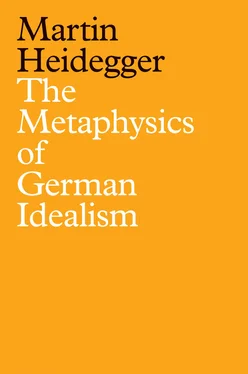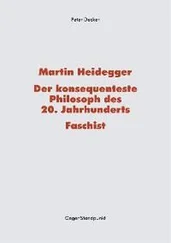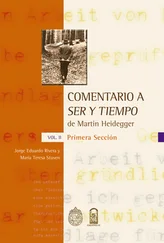The word “ Da ” {there, here}, the “ Da ,” means precisely this clearing for Sein {being}. The essence of Da-sein is to be this “ Da .” The human takes this on, namely, to be the Da , insofar as he exists {…}. What is meant is not “ Da sein” in the sense of the presence of a thing or of the human that is here and there and “ da ”; rather, what is being thought is “Da- sein ,” that the clearing for being in general essences and is (p. 47).
3. The verb essences translates the rare verb wesen , which, in its noun form, Wesen , means “essence.” Although Wesen can refer to a being, as in the term Lebewesen , “creature” or “living being,” we have either translated it as “essence” or, when not, supplied the German, since this is a crucial term for both Heidegger and Schelling. Heidegger occasionally accentuates the verbal character of the word with the noun Wesung , which we have translated by “essencing.” “Presencing” and “to presence” translate Anwesung and anwesen .
4. Heidegger exploits the etymology of numerous words built on the root verb stellen , “to place.” Darstellen appears as “presenting” or, when hyphenated, as “presenting forth”; Vorstellen appears as “representing” or, when hyphenated, as “re-presenting,” although one should bear in mind that it also has the literal spatial sense of “placing before”; Herstellen appears as “producing”; and Zustellen as “delivering.”
Since Heidegger uses both parentheses and square brackets, we have placed all of our notes and interpolations in curly brackets. We have also included, in the margins, the pagination of the original German. 5For foreign phrases that cannot readily be found in a lexicon, we have provided common translations in footnotes. For individual Greek and Latin words, we have supplied, at the end of the volume, a lexicon with typical translations. Readers consulting the lexicon should bear in mind that it is intended as a resource for beginning to work through Heidegger’s own use and interpretation of these words, not as a replacement or definitive rendering.
Following Anglophone conventions, we have italicized foreign words and phrases. When Heidegger himself emphasizes them, or when the words are already emphasized in material he is quoting, we have added underlining. In his citations of Leibniz, several words are written gesperrt , spaced out for emphasis. We have retained this spacing in order to distinguish it from other types of emphasis. Words appearing in Greek script have been transliterated.
We would like to thank Katie Chenoweth, Tobias Keiling, Richard Polt, Philipp Schwab, Tim Steinebach, and two anonymous reviewers for their helpful comments on the translation.
Ian Alexander Moore Rodrigo Therezo
1 1. Martin Heidegger, “Brief über den ‘Humanismus,’” in Wegmarken, Gesamtausgabe vol. 9, ed. Friedrich-Wilhelm von Herrmann (Frankfurt am Main: Vittorio Klostermann, 1976), p. 344.
2 2. Heidegger, Hölderlins Hymne “Der Ister,” Gesamtausgabe vol. 53, ed. Walter Biemel (Frankfurt am Main: Vittorio Klostermann, 1984), pp. 80–81.
3 3. Heidegger, “Der Spruch des Anaximander,” in Holzwege, Gesamtausgabe vol. 5, ed. Friedrich-Wilhelm von Herrmann (Frankfurt am Main: Vittorio Klostermann, 1977), p. 338 (emphasis added).
4 4. Martin Heidegger, Schellings Abhandlung über das Wesen der menschlichen Freiheit (1809), ed. Hildegard Feick (Tübingen: Max Niemeyer, 1971) / Schelling’s Treatise on the Essence of Human Freedom, trans. Joan Stambaugh (Athens: Ohio University Press, 1985).
5 5. Martin Heidegger, Die Metaphysik des deutschen Idealismus. Zur erneuten Auslegung von Schelling: Philosophische Untersuchungen über das Wesen der menschlichen Freiheit und die damit zusammenhängenden Gegenstände (1809), Gesamtausgabe vol. 49, ed. Günter Seubold, 2nd edn. (Frankfurt am Main: Vittorio Klostermann, 2006).
Introduction: The Necessity of a Historical Thinking
§ 1 Schelling’s Treatise as the Peak of the Metaphysics of German Idealism
According to the announcement, 1we will deal with the Metaphysics of German Idealism here. We shall attempt to do so by way of an interpretation of Schelling’s “Freedom Treatise.” We have thus singled out an isolated writing of one single thinker from this epoch. This procedure is in order if we generally limit ourselves to learning about only this text of this thinker, thereby becoming familiar with a limited sphere of the thinking of German Idealism. Yet this procedure becomes questionable as soon as there lurks in the background the claim to think through, by way of such a path, “ the metaphysics of German Idealism as such. ” This claim will guide us nevertheless.
But then the intended one-sided approach requires a particular justification. How else should this be accomplished than by a knowledge of what is thought in this isolated treatise by Schelling? In this, we already presuppose that this isolated treatise reaches the peak of the metaphysics of German Idealism. However, the earliest we can discern this is at the end of a completed interpretation, or perhaps even only after a manifold interpretation.
When is it the case that this apparently isolated and arbitrary path is justified and even necessary?
1. If Schelling’s treatise is the peak of the metaphysics of German Idealism.
2. If all the essential determinations of this metaphysics are borne out in this treatise.
3. If, at all , the essential core of all Western metaphysics is able to be exposed in complete determinacy on the basis of this treatise.
2
The procedure therefore remains violent, at least at the beginning. Put more precisely: the procedure always appears violent to the commonplace opinion that only the frequently mentioned “historiographic completeness” provides the guarantee for the knowledge of history. But perhaps this opinion is only an opinion, an assumption that is ungrounded, or poorly grounded, or even altogether ungroundable in terms of the essence of history. Perhaps that is so. In order to raise this conjecture to the level of certainty and, in this way, to justify our undertaking, we would admittedly have to engage in a consideration whose extensive scope and difficulty hardly take a back seat to an interpretation of the selected treatise. For it would have to be shown that, and in what way, the historicality of the history of thinking is unique, that this history can, to be sure, look like historiographic reflection, but in truth has, rather, an essence of its own and also does not coincide with what one in this field otherwise tends to oppose to historiographic presentation, namely, “systematic” reflection.
These brief indications already make clear that, at the beginning, our undertaking remains surrounded by a tangle of different sorts of misgivings and all too easily misleads one to untangle and iron them all out prior to the proper work, thereby deferring, however, the proper work of interpretation time and again. In order to avoid this danger, there is evidently only one good way out, namely, to begin blindly with the elucidation of Schelling’s treatise and to trust that some benefit will come of it.
§ 2 Historical Thinking, Historiographic Explanation, Systematic Reflection
This seemingly “natural” carefreeness would certainly be allowed to guide us if it were only a matter of drawing out what Schelling meant. To be sure, the correct rendering of his thought already requires enough of our ability to think. And yet – thinking it once again does not already guarantee that we ourselves would presently also be those who think, in the sense of those whom we call thinkers. But we are not willing to renounce this. Why not? Out of some stubbornness and will to thought? That would be too little, essentially too little, to let us persevere with thought.
Читать дальше












